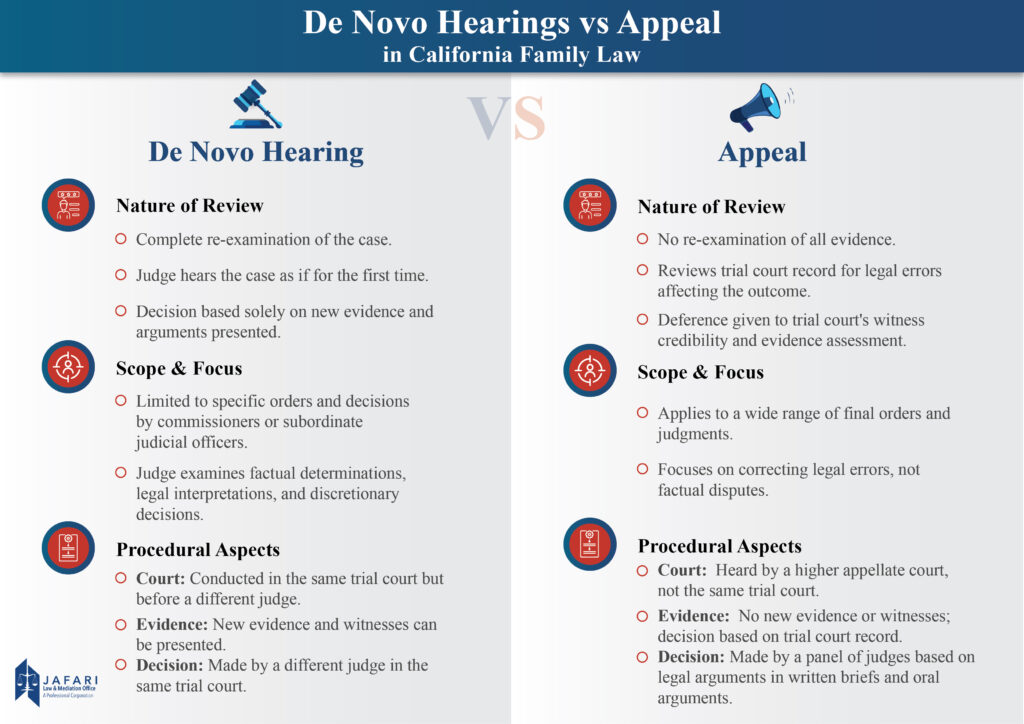Particularly in matters of child support, understanding the process and rights associated with a De Novo Hearing is essential for ensuring fair and just outcomes. This article delves into the specifics of De Novo Hearings for child support, explaining their significance, the legal framework governing them, and the steps involved in requesting and preparing for such a hearing.
What is a De Novo Hearing?
A De Novo hearing, from the Latin term meaning ” anew”, offers a chance to revisit certain family law motions and orders related to child custody, support, and other sensitive issues. In these hearings, the court reviews a matter entirely afresh, without being bound by the prior findings or decisions of a lower court or administrative agency. Essentially, the judge hears the case as if it were being presented for the first time.
De Novo Hearings in Child Custody Cases
California Family Code Section 4251 specifically grants commissioners the authority to hear and make determinations on family law matters, including child support. It also stipulates that parties must be informed of their right object to a commissioner hearing their case and their right to a de novo hearing.
A party may object to the commissioner hearing their case as soon as they become aware that a commissioner will be presiding over their case. The objection can be made verbally in court when the case is called, or it can be filed in writing if the party is aware of the commissioner assignment in advance. If they do not object, they are deemed to have consented.
Even if a party does not object to a commissioner hearing their case initially, they can still request a de novo hearing after the commissioner makes a decision. A request for a de novo hearing must typically be made within a specific timeframe after the commissioner’s decision. In California, this is generally within 10 calendar days after the commissioner’s recommendation or order is served.
Process of Requesting a De Novo Hearing
- Filing a Request: The dissatisfied party must file a request for a de novo hearing, usually within 10 days of the commissioner’s order being served.
- Notice: Proper notice of the request must be provided to the other party.
- Hearing Date: The court schedules a de novo hearing, where a judge hears the case afresh.
Grounds for a De Novo Hearing

There are several grounds on which a party might request a de novo hearing in California family law cases. They are commonly requested when a party is dissatisfied with a decision made by a commissioner or referee in specific contexts, such as child support orders. They are also used when due process concerns or procedural errors are significant enough to warrant a complete re-evaluation of the case. Here are some common reasons for requesting a De Novo Hearing.
- Disagreement with a Commissioner’s Decision: In California family law, commissioners often handle a variety of matters, including child custody, support, and other domestic issues. If a party disagrees with the decision of a commissioner, they can request a de novo hearing before a judge.
- Legal Errors: If there were legal errors in the initial hearing, such as misinterpretation or misapplication of the law, a de novo hearing can be requested to correct these errors.
- Procedural Issues: Procedural errors, such as improper notice or failure to allow sufficient time for a party to present their case, can also be grounds for a de novo hearing.
- New Evidence: If new evidence has come to light that was not available during the initial hearing, a party may request a de novo hearing to present this new information.
- Inadequate Representation: If a party believes they were inadequately represented by their attorney during the initial hearing, they may request a de novo hearing to ensure their case is fully and properly presented.

Can a De Novo Hearing Request Get Denied?
Yes. In California family law, a request for a de novo hearing can be denied for several reasons. These denials are often based on procedural grounds, timing issues, or the lack of substantive justification for the request. Here are some common reasons why a de novo hearing request might be denied:
Reasons for Denial of a De Novo Hearing Request
- Untimely Request: The request for a de novo hearing must be filed within a specific time frame, typically within 10 days after the commissioner’s order is served. If the request is filed late, the court may deny it on procedural grounds.
- Lack of Proper Notice: If the requesting party fails to properly notify the other party of the de novo hearing request, the court may deny the request. Proper notice ensures that all parties are aware of and can prepare for the hearing.
- Insufficient Grounds: The request must include valid reasons for a de novo hearing, such as legal errors, procedural issues, or new evidence. If the court finds that the reasons provided are insufficient or do not warrant a new hearing, the request may be denied.
- Waiver of Rights: If the party requesting the de novo hearing previously waived their right to such a hearing, either explicitly or implicitly through their actions, the court may deny the request. This could occur if the party agreed to the commissioner’s decision or failed to object during the initial hearing.
- Lack of Jurisdiction: If the court determines that it does not have jurisdiction over the matter, it may deny the de novo hearing request. Jurisdictional issues could arise if the case is not properly within the family court’s purview.
- Non-Appealable Issues: Some matters decided by commissioners are not subject to de novo review. If the issue falls into this category, the court may deny the request for a new hearing.
- Frivolous or Bad Faith Requests: If the court finds that the request for a de novo hearing is frivolous or made in bad faith—perhaps to delay proceedings or harass the other party—the request may be denied.
- Failure to Comply with Court Rules: If the requesting party fails to comply with specific court rules or procedures required for filing a de novo hearing request, such as not providing sufficient detail in the request or not following proper formatting, the court may deny the request.
When requesting a de novo hearing, it is crucial to adhere to procedural requirements and provide clear, substantive reasons for the request. Consulting with an attorney can help ensure that the request is properly prepared and increases the likelihood of it being granted.
De Novo Hearings vs. Appeal

In California family law, both de novo hearings and appeals are mechanisms for challenging a court’s decision, but, as seen above, they differ significantly in their processes, purposes, and the way the cases are reviewed. Here’s a detailed comparison between a de novo hearing and an appeal:
De Novo Hearing
Nature of Review
De Novo hearing involves a complete re-examination of the case. The judge hears the case as if it were being presented for the first time, without considering the previous ruling. All evidence and arguments are presented anew, and the judge makes a decision based solely on the information presented at the hearing.
Scope & Focus
De novo hearings are typically limited to specific types of orders and decisions made by commissioners or subordinate judicial officers in family law cases.
The judge focuses on all aspects of the case, including factual determinations, legal interpretations, and discretionary decisions.
Procedural Aspects
The court: The hearing is conducted in the same trial court but before a different judicial officer, usually a judge.
Evidence: Parties cannot introduce new evidence or present new witnesses. The appellate court bases its decision solely on the existing record from the trial court.
Decision: The decision maker is a different judge in the same trial court where the original matter was heard,
Appeal
Nature of Review
The appellate court does not re-examine all the evidence or re-hear the entire case, giving deference to the trial court’s role in assessing witness credibility and evidence. Instead, it reviews the record of the trial court proceedings to determine if there were legal errors that affected the outcome.
Scope & Focus
Appeals can be made on a wide range of final orders and judgments, including those from trials or other hearings.
The appellate court focuses on correcting legal errors, not factual disputes.
Procedural Aspects
The Court: Appeals are NOT conducted in the same trial court but before a different judicial officer. Instead, they are heard by a higher appellate court.
Evidence: Parties cannot introduce new evidence or present new witnesses. The appellate court bases its decision solely on the existing record from the trial cou
Decision: Made by a panel of judges based on the trial court’s record and the legal arguments presented in the written briefs and, if applicable, oral arguments.
Conclusion
A de novo hearing in child custody cases allows for a fresh review of the matter by a judge, ensuring that parties have the opportunity to fully present their case and any new evidence. California Family Code Section 4251 provides the framework for this process, particularly in cases involving commissioners’ determinations, and safeguards the parties’ right to have their case heard anew by a judge.
Contact A Child Custody Lawyer Today
If you’re facing a challenging child custody decision made by a commissioner, you have the right to a fresh review. Contact our experienced child custody attorneys in Los Angeles today to request a de novo hearing. Let us help you ensure your case is thoroughly re-evaluated for the best possible outcome. Call now for a consultation and take the first step towards securing your family’s future.
Disclaimer: The information provided on this website does not, and is not intended to, constitute legal advice. All information, content, and materials available on this site are for general informational purposes only. Information on this website may not constitute the most up-to-date legal or other information. This website contains links to other third-party websites. Such links are only for the convenience of the reader, user, or browser. Jafari Law and Mediation Office and its members, employees, and owners do not recommend or endorse the contents of the third-party sites.

